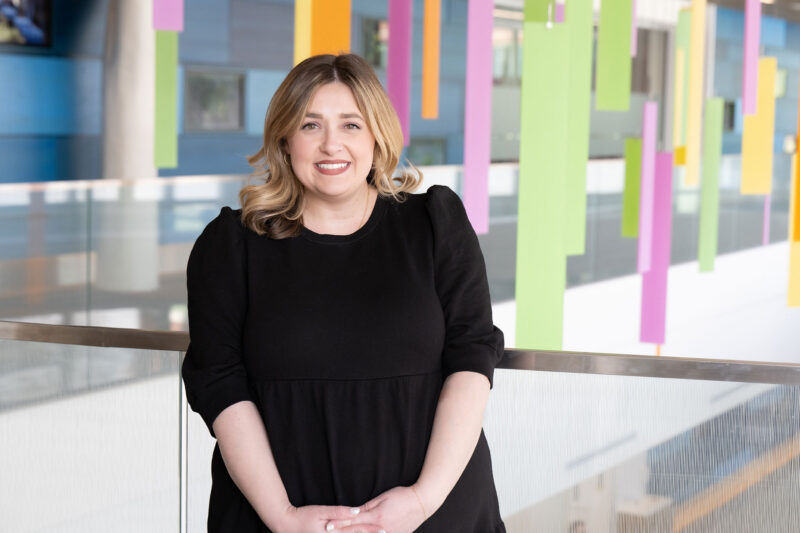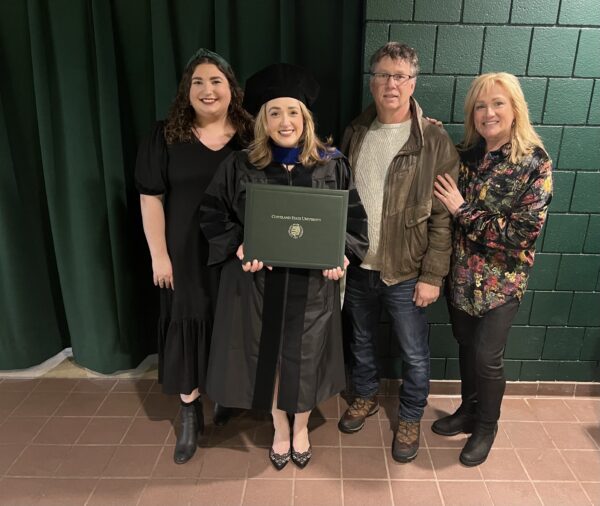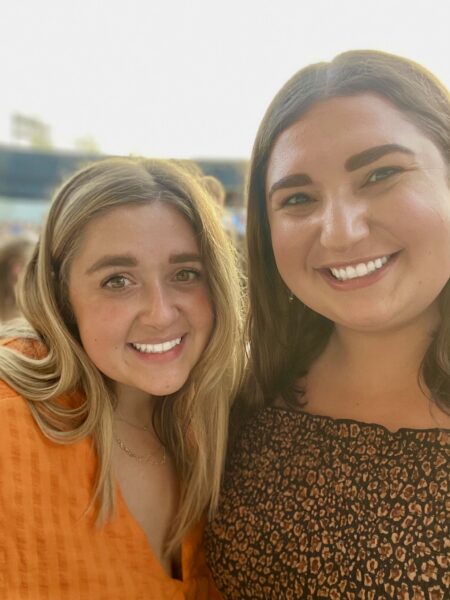Dr. Allison Griesmer is an Ohio native, originally from the Lake County area. She attended The Ohio State University for her undergraduate degree and moved to Cleveland, where she earned her master’s degree in Clinical Psychology and her doctorate in Urban Education, Counseling Psychology specialization from Cleveland State University.
She resides in the Akron area with her dog, a Havanese named Louis. In her free time, she enjoys visiting the Cleveland Museum of Art, the Cleveland Museum of National History, catching a Guardians game, attending concerts, traveling and picking up new hobbies, most recently teaching herself how to hand-embroider.

Describe your role and what you hope to accomplish.
I’m a clinical child psychologist in Neurobehavioral Health. My primary role includes completing autism evaluations with patients who have been referred to the Autism Diagnostic Clinic. Likewise, I’m equally passionate about working with parents, families, and children with challenging behaviors through parent management training, and working with patients and their families who have experienced adverse childhood experiences. I’m hoping to increase access to evidence-based services, including autism evaluations and trauma-informed therapy services.
Why did you choose your area of expertise?
Initially, I was not interested in working with children and families. At the beginning of the third year of my doctoral program, my adult-focused practicum site informed me that they would no longer be able to supervise my training. I ended up finding a new practicum placement at a community mental health agency that was also a psychiatric residential treatment facility for children and adolescents. I quickly fell in love with working with children and families. As I was ending this rotation, my then supervisor encouraged me to contact a nearby private practice that she believed would provide me with additional training. Fast forward nine months and I ended up matching [for internship] to a children’s community mental health agency, Sarah A. Reed Children’s Center (Sarah Reed) in Erie, PA. I completed both internship and fellowship at Sarah Reed and was afforded incredible training opportunities along the way, including school behavioral consultation, diagnostic assessment, trauma-focused child therapy, and family therapy. During my two years in Erie, PA, I routinely found myself gravitating back to autism evaluations and working to sharpen my skillset. I learned the ins-and-outs of psychological assessment from the ground up, including how to continuously improve an assessment clinic, how to work with managed care organizations, and appropriately bill insurance for the services provided. My passion for efficient processes and an expansion of accessibility to autism evaluations peaked. Looking back on the past five years, it’s clear to me why I decided to focus on autism evaluations. There is a substantial need in our community to provide this clinical service with a clear shortage of providers who have a high level of dedicated knowledge. Increasing patient access to our services is perfectly aligned with ACH’s three promises and mission.
What unique or different skills do you have that help you practice psychology?
My doctoral training was completed through the lens of counseling psychology. As a field, counseling psychology is committed to the holistic psychological perspective that is strengths-based, person and community centered, systems-oriented, contextually aware, multiculturally inclusive, socially just and integrative of lifespan issues. Using these principles as a roadmap, my clinical practice and the context by which I work with patients and their families, is culturally informed and culturally sensitive. It’s the understanding that meeting patients and their families where they’re at in the evaluation process will look different at each encounter. Also, considering how environmental and contextual influences shape my patient’s concerns and experiences.
How do you deal with the emotional impact of being a provider?
During one of the first clinical supervisions as a new PhD student, my supervisor told me to leave the office occasionally, stop, and look at the trees. It’s a practice I’ve continued of intentional and regularly scheduled breaks from my office. I’ve found many of the skills in dialectical behavior therapy, such as trying to be in wise mind, and the idea of dialectics have made a difference in my clinical practice.
What makes the best part of your day?
In a clinical setting, it’s providing clarity and support to families who I might be their second, third, or fourth provider for their child’s concerns. Outside the hospital, and when the weather cooperates, I love sitting on my patio with a fresh cup of coffee, listening to my favorite vinyl records, and taking my dog for a long walk.

Allison with her family on graduation day after receiving her doctorate.
What achievements are you most proud of?
I’m proud of myself for defending my dissertation, graduating as the first in my family with a PhD, passing my licensure exams, and landing my dream job. I think it’s rare to set a long-term career goal at 18 and then be able to say “look, I actually did all of these really challenging things and sacrificed a lot in my twenties to achieve this seemingly far-reaching goal and now I’ve got my dream job.”
What was the last adventure you went on?
My love of traveling and live music complement one another. Post-COVID, my sister and I traveled to see one of our favorite bands at Red Rocks Amphitheater in Morrison, Colorado. This summer, I’m going on an Alaskan cruise, traveling back to Red Rocks and visiting the Boston area for a few days.

Alison with her sister, Lindsay, attending a concert at Red Rocks Amphitheater.
What piece of advice did someone give you when you were young that still resonates with you today?
On the first day of my internship at Sarah Reed, a supervisor casually and playfully told our intern class that “we’re not that important” after we had expressed feeling worried about making mistakes during the internship years. It’s a humbling reminder that even if something goes wrong in a session, or a deadline is missed, or you don’t complete something at 110 percent, the world will absolutely continue to turn, and the sun will still rise tomorrow. We can get caught up in putting so much pressure on ourselves to be the best that we often don’t allow ourselves the grace to be human.










